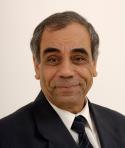
Biography:
Professor Salah Arafa is a tenured faculty member at the Physics Department, School of Sciences and Engineering of the American University in Cairo (AUC). He joined AUC in 1968. Before joining the University, he worked as a physics researcher at the Egyptian Atomic Energy Authority from 1962 till 1968.
Arafa holds a BSc in Physics and Chemistry (1962), MSc in Nuclear Physics (1966), and a PhD in Solid State Physics (1969); all from Cairo University. He was the Chairman of the Science Department twice and served as senator at large in the University Senate.
Professor Arafa is well known as one of the leading Social Entrepreneurs in Egypt and the Arab World. He was selected a Senior Ashoka Fellow in 2004 and was awarded Man of the Year for Environment and Development in 2009. He is now a member of the Steering Committee of the African Renewable Energy Alliance (AREA).
Since 1974, Arafa is involved in many Civil Society activities and is today the chairman and founder for few of the leading NGOs in Egypt. He has also served as consultant to many international organizations: US-AID, UNICEF, GTZ, EU, and UNDP. He is a member of the National Committee on Climate Change and also a member of the Research Council on Environment and Development at the Egyptian Academy for Scientific Research and Technology.
Professor Arafa's work in the fields of Renewable Energies, Climate Change Impacts, Sustainable Community Development, and Eco-communities is nationally and internationally recognized. In 24 June 2015 Arafa was selected a Fellow Professor of Renewable Energy and Sustainable Development by the Stromstad Academy of Sweden (www.stromstadakademi.se).
Abstract:
Renewable Energy for Sustainable Development and Poverty Reduction: the Case of Basaisa, Egypt.
The paper discusses the implementation of renewable energy technologies to overcome some of the barriers faced by rural villages and desert communities in Egypt to achieve poverty reduction, social justice, and sustainable development. It reports on the experiences gained over more than 40 years of working in the field of utilization of renewables and other technologies in Basaisa village, Al-Sharkiya Governorate (www.google.com/BasaisaVillage) and New Basaisa community, South Sinai Governorate (www.google.com/NewBasaisaCommunity), in Egypt towards achieving community-based and citizen-centered sustainable development.
It also addresses how such interventions improved the human wellbeing and empowered poor citizens and communities to achieve sustainable development. Field experiences showed that open free dialogues with all stakeholders, site-specific education and training, appropriate local financing systems, and access to knowledge are key-elements and essential factors for achieving green economy and sustainable community development.